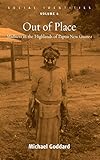Out of Place : Madness in the Highlands of Papua New Guinea / Michael Goddard.
Material type: TextSeries: Social Identities ; 6Publisher: New York ; Oxford : Berghahn Books, [2011]Copyright date: ©2011Description: 1 online resource (200 p.)Content type:
TextSeries: Social Identities ; 6Publisher: New York ; Oxford : Berghahn Books, [2011]Copyright date: ©2011Description: 1 online resource (200 p.)Content type: - 9780857450944
- 9780857450951
- Ethnopsychology -- Papua New Guinea -- Western Highlands Province
- Papuans -- Mental health -- Papua New Guinea -- Western Highlands Province
- Papuans -- Papua New Guinea -- Western Highlands Province -- Mental health
- Papuans -- Papua New Guinea -- Western Highlands Province -- Psychology
- Papuans -- Papua New Guinea -- Western Highlands Province -- Social conditions
- Psychiatry, Transcultural -- Papua New Guinea -- Western Highlands Province
- SOCIAL SCIENCE / Anthropology / Cultural & Social
- Medical Anthropology
- 362.2099536 22/eng
- DU740.42 .G615 2011
- DU740.42
- online - DeGruyter
| Item type | Current library | Call number | URL | Status | Notes | Barcode | |
|---|---|---|---|---|---|---|---|
 eBook
eBook
|
Biblioteca "Angelicum" Pont. Univ. S.Tommaso d'Aquino Nuvola online | online - DeGruyter (Browse shelf(Opens below)) | Online access | Not for loan (Accesso limitato) | Accesso per gli utenti autorizzati / Access for authorized users | (dgr)9780857450951 |
Frontmatter -- Contents -- Preface -- Acknowledgements -- Map -- Introduction -- 1. The Development of Psychiatry in Papua New Guinea -- 2. Psychiatric Theory and Practice in Papua New Guinea -- 3. Madness and the Ambivalent Use of Psychiatry in the Kaugel Valley -- 4. Affliction and Madness -- 5. The Social Construction of Madness: Lopa’s Season -- 6. The Social Construction of Madness: The Mad Giant -- Conclusion: In Anticipation of a Kakoli Ethnopsychiatry -- Appendix A: Orthography -- Appendix B: Glossary of Umbu Ungu Terms -- References -- Index
restricted access online access with authorization star
http://purl.org/coar/access_right/c_16ec
The Kakoli of the Western Highlands of Papua New Guinea (PNG), the focus of this study, did not traditionally have a concept of mental illness. They classified madness according to social behaviour, not mental pathology. Moreover, their conception of the person did not recognise the same physical and mental categories that inform Western medical science, and psychiatry in particular was not officially introduced to PNG until the late 1950s. Its practitioners claimed that it could adequately accommodate the cultural variation among Melanesian societies. This book compares the intent and practice of transcultural psychiatry with Kakoli interpretations of, and responses to, madness, showing the reasons for their occasional recourse to psychiatric services. Episodes involving madness, as defined by the Kakoli themselves, are described in order to offer a context for the historical lifeworld and praxis of the community and raise fundamental questions about whether a culturally sensitive psychiatry is possible in the Melanesian context.
Mode of access: Internet via World Wide Web.
In English.
Description based on online resource; title from PDF title page (publisher's Web site, viewed 25. Jun 2024)


